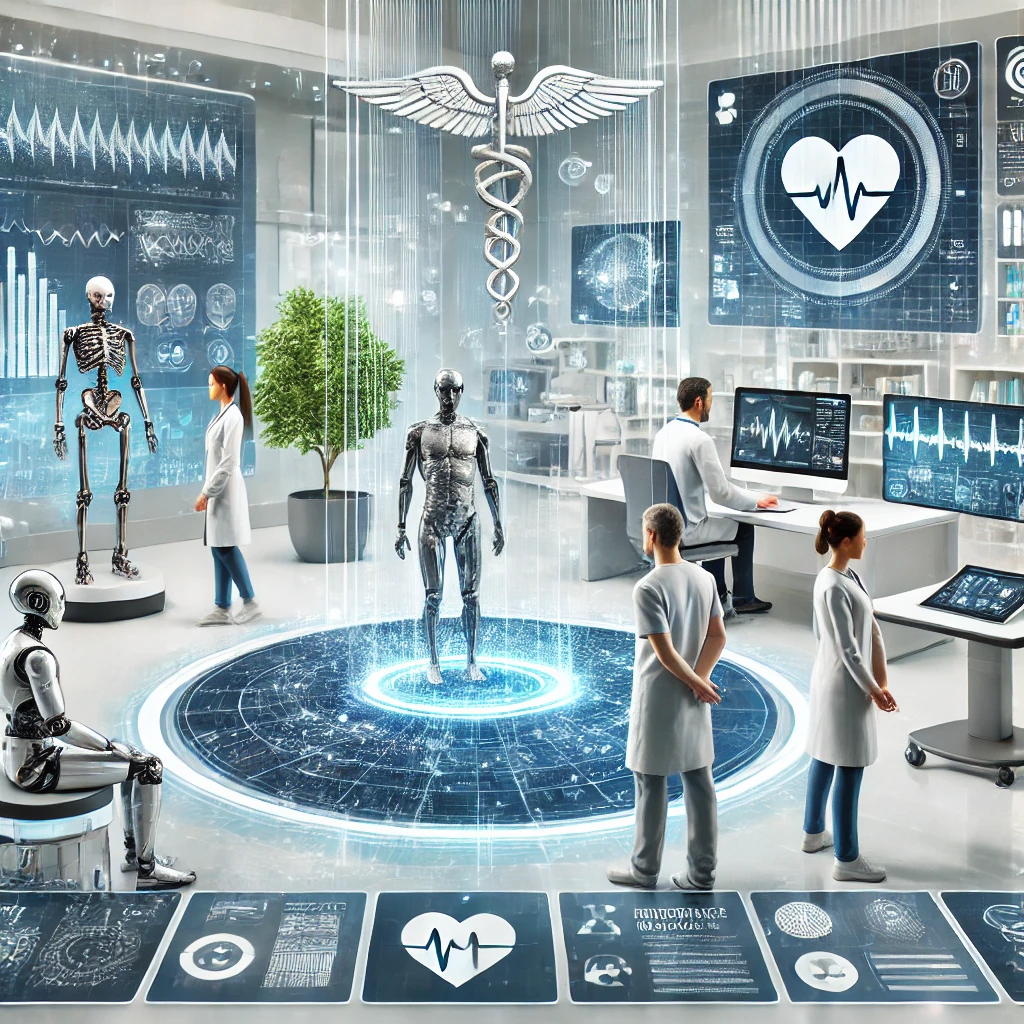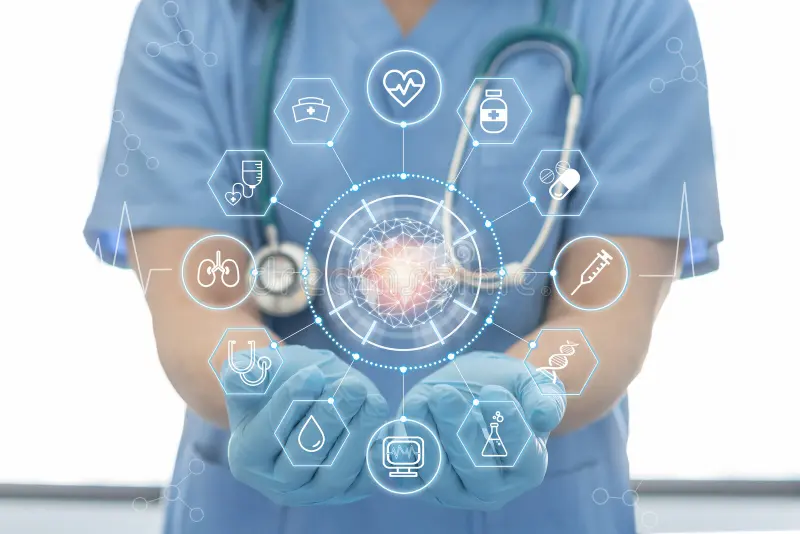Healthcare industry underwent significant changes within the past few decades since technology introduced innovations which both enhanced patient care while improving operational efficiency and minimizing expenses. These healthcare tech companies guide the development of advanced solutions that cover patient monitoring along with electronic health records (EHR) and telemedicine and artificial intelligence (AI).
Healthcare tech companies actively address the present healthcare challenges because fast and precise diagnoses together with better treatment affordability and improved patient results have become necessary healthcare demands. Healthcare technology companies direct healthcare development through their revolutionary technologies which enhance healthcare system efficiency and patient encounters.
This article examines healthcare tech company functions and the leading organizations that excel in healthcare technology while discussing their new developments which transform the medical field.
What Are Healthcare Tech Companies?
Healthcare tech companies develop innovative technologies to make healthcare delivery systems more efficient by writing and implementing these technologies for medical use. The healthcare technology field encompasses operations in medical devices as well as health data management and telemedicine and diagnostics and pharmaceutical development and health information technology. These companies join forces with medical establishments as well as clinical physicians and research teams together with healthcare professionals to establish solutions that boost patient care quality and optimize both operational tactics and therapeutic results.
Numerous organizations positioned between healthcare and technological systems are leading the modernization movement throughout the healthcare sector. Healthcare technology companies drive major healthcare developments through their work to improve service efficiency along with service effectiveness which leads to achievements like remote patient monitoring and AI diagnostics and robotic surgery developments.
Healthcare Tech Companies Establish Core Technological Frameworks
1. Electronic Health Records (EHR) Systems
Healthcare made a major leap forward as healthcare providers adopted digital systems for recording patient medical information. Through Electronic Health Records (EHR) systems healthcare providers receive the capability to electronically maintain and retrieve and transmit patient medical data. Through this technology paper records become obsolete while specialist and nurse and doctor access to patient information improves coordination between health professionals.
Through EHR systems healthcare professionals achieve better operational speed and lower their probability of error while no longer needing traditional pen-and-paper documentation methods.
Truthful contemporary medical information enables doctors to make enhanced medical judgments which improves individualized support for patients.
EHR systems provide cross-institution data sharing among healthcare providers who need to access patient information for continuous healthcare delivery.
2. Telemedicine and Telehealth Solutions
Cellular and other technological solutions developed by healthcare companies enable medical consultations through video conferencing in addition to phone calls and secure messaging for patients. Healthcare underwent significant changes because telemedicine became rapid popular in the COVID-19 era bringing patients closer to medical expertise while minimizing hospital demand.
Return patients have better accessibility to healthcare services because they can obtain medical care at home instead of going to medical facilities.
The ability to learn remotely becomes highly important since it enables rural patients who face poor healthcare service accessibility to receive medical help.
Virtual consultations function more cheaply than office meetings thus establishing economical treatment choices between patients and health care institutions.
3. Artificial Intelligence (AI) and Machine Learning
Healthcare professionals apply AI and machine learning algorithms to three significant clinical applications which include medical diagnosis and tailored treatment design and statistical forecasting. Healthcare technology organizations apply AI to huge medical information repositories such as pictures and patient documentation along with genetic sequences to deliver swift and precise diagnoses.
Computing techniques help medical image scans (X-rays, CTs and MRIs) identify abnormalities that escape human physician observation.
Historical patient data allows AI systems to estimate health results and identify possible readmission risks and complications which healthcare providers use to care for their patients actively.
The utilization of AI allows practitioners to generate patient-specific therapeutic options from assessment of each person’s genetic profile together with medical documentation thus enhancing medical outcomes.
4. Wearable Health Devices
The growing market of healthcare technology companies has produced wearable healthcare devices that measure multiple health parameters directly from the body. The monitoring of essential body signs through smartwatches and fitness trackers along with continuous glucose monitors (CGMs) enables the assessment of vital statistics and physical movements together with sleep quality and management of chronic diseases.
Persistent illness management becomes possible through diabetes-specific technology which enables continuous patient and doctor monitoring of chronic diseases through CGMs.
Medical devices connected to the body deliver health statistics which help doctors recognize warning signs in advance to deliver prompt medical support.
Patient involvement in healthcare increases when they monitor their health metrics thus resulting in better health outcomes.
5. Robotics and Automation
Robotics continue their advancements in healthcare spheres through surgeries and technologies that provide care to patients. The da Vinci Surgical System together with other robotic systems aids surgeons to conduct minimally invasive procedures with higher precision. Hospital and pharmacy automation implements systems which enhance pharmaceutical delivery systems as well as manage medical supplies and contribute to patient recovery processes.
Medical robots make surgical operations more specific and let doctors perform minimally invasive surgeries thus patients recover faster while safety remains high.
Medical exoskeletons based on robotics enable physical disability patients to restore their walking abilities through their use.
Medical robotic systems enable better medication dispensing accuracy along with efficiency to decrease medication errors in pharmacies.
The Healthcare Industry is Currently Being Transformed by the Leading Technology Companies Working in This Domain.
1. Philips Healthcare
Philips Healthcare functions as a top healthcare technology company globally to offer medical imaging solutions combined with health informatics features and patient monitoring capabilities. Hospital providers benefit from AI-powered diagnostic and telemedicine solutions combined with innovative technologies delivered by the company that enables better patient care.
The primary offerings of the company consist of MRI machines, X-ray systems, patient monitoring devices together with AI-powered imaging software.
2. Medtronic
The worldwide leader Medtronic supplies medical devices alongside therapeutic applications that serve cardiac care needs and diabetes management requirements besides neurological disorder treatment. The healthcare technology solutions at the company cover robotic surgery systems alongside implantable devices that track patient health in real time.
The company produces four main product lines which include insulin pumps together with pacemakers and robotic-assisted surgery systems with cardiovascular monitoring devices.
3. Cerner Corporation
Cerner operates as a leading company within the healthcare IT domain to create EHR systems alongside health information technology solutions for medical facilities. Through its medical products Cerner provides healthcare organizations better access to data management systems as well as decision-making capabilities for improved patient outcomes.
Flagship Products: EHR systems, population health management tools, and clinical decision support software.
4. Teladoc Health
Remote healthcare consultations are the specialty of Teladoc Health through their telemedicine service platform. The healthcare platform of the company delivers virtual health services which encompass primary care along with mental health counseling and dermatology and telehealth treatment services for urgent and routine medical needs.
Flagship Products: Virtual consultations for general healthcare, mental health services, and remote monitoring solutions.
5. Abbott Laboratories
The primary business activities of Abbott Laboratories include developing diagnostic solutions and medical instruments alongside health surveillance products. Due to its innovative approaches Abbott Laboratories commands recognition for its blood glucose monitoring solutions and its cardiovascular devices and its infectious disease test products.
Gene editing and CRISPR technologies demonstrate their ability to treat genetic diseases as well as deliver personified therapies against cancer.
Using AI technology will advance healthcare solutions till they improve diagnostic precision and treatment methods and patient care which results in better individualized and efficient medical services.
Healthcare data managed by Blockchain provides secure means to share and protect patient medical records which enhances patient access to their health information.
Conclusion: Embracing the Future of Healthcare
Technological companies focused on healthcare serve as the core drivers that change healthcare service delivery methods. These healthcare companies transform medical delivery through AI adoption and robotic implementation together with telemedicine expansion and wearable technology growth to provide clients with more accessible and efficient and cost-friendly healthcare.
Healthcare tech companies create fantastic workplace options for those who blend medical expertise with technological interest since they drive both advancement and better patient care. Technological advancements will build a healthcare system which offers tailored precise healthcare services that are more available than traditional practice.





